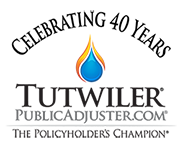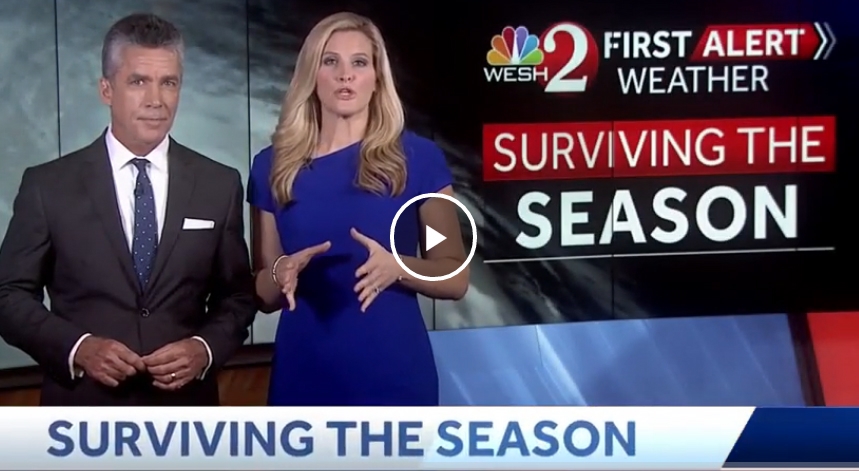Every property insurance claim has unique circumstances based on the language in your policy and the type of loss. Feel free to contact Tutwiler & Associates Public Adjusters for specific questions related to your claim. We hope the video and claim tips below will help you prepare for hurricane season and avoid mistakes with any property insurance claim you may experience.
More Property Insurance Claim Tips for you to use from Tutwiler & Associates Public Adjusters
- Report your damage to the insurance carrier, not the agent who sold you the policy.
- Don’t make permanent or emergency repairs until you or an adjuster have documented the damage. Then mitigate your loss to prevent any further damage from occurring. Your insurance policy requires this and this is your responsibility. And don’t throw away any damaged materials until the insurance adjuster has seen them and inspected your property. You do not want to prejudice the investigation of your insurance claim. While you are expected to take reasonable steps to prevent further damage from occurring, we often see policyholders rush to “repair” the property only to bring the actual damages into question. In some cases you are harming your claim by simply eliminating the evidence. So take pictures!
- Don’t be afraid to ask your insurance company for an advanced payment for any undisputed amounts until an agreement can be reached on the rest of your claim. This will help you get repairs started and avoid heavy out-of-pocket expenses. Take extensive photographs of all the damage, and keep all your receipts and documents, as well as records of conversations with the insurance company.
- Do not sign a contract with an assignment of benefits clause. It will relinquish any benefits that you may receive from your claim and may open the door for excessive repair bills. Do not relinquish control of your claim.
- Understand the difference between the terms “flood” and “water” damage in insurance parlance. Flood damage is rising water and covered under a separate Federal flood insurance policy. Water damage is defined as water intrusion from roof, windows, pipe bursts. The language you use with your insurance claim can make a difference in your claims experience.
- Make sure you understand the true cost to repair your damage before agreeing to or signing a final settlement agreement. For major repairs, get a minimum of three estimates. Don’t hesitate to question the contractors on variations in pricing and understand that material and labor prices will increase after a major storm. Ensure you get a quality job at a fair price. Make sure all estimates provide work details, offer a fixed price and are signed.
- Get a written quote from the restoration contractor before they do the work and make sure to get it approved by your insurance carrier. Get everything in writing. Don’t sign any repair contract until your insurance company OK’s it. Or add a contingency clause to the contract that states the agreement is subject to the approval of your insurance carrier. Watch out for anyone who balks. It could be a red flag.
- Be present (or have your public adjuster present) when the adjuster working for the insurance company arrives and make sure to show them all damage. Ask the adjuster for his or her credentials and work experience. It may come as a surprise, but many insurance adjusters are only required to complete a three day crash course before they are allowed to show up at your door. If you feel they are not qualified or you are not happy with the adjuster, engineer, or any other so called “expert” the insurance company provides, demand a new person as soon as possible. Take your time and do not let them rush you. Also take notes of things you agree upon and also those you disagree on. In many cases the adjuster who shows up to your house first will not see your claim through to the end. The final decision on your claim may be by someone who may have never visited and inspected your loss in person. Get everything in writing in case the next adjuster disagrees with what the first adjuster agreed to.
- Some insurance companies now operate what are called a Managed Repair program which means they send out contractors who have signed work agreements with them to fix your property, sometimes at fixed or reduced fees. This is done to save claim expenses and also avoid unethical contractors. A problem with this model is that a contractor may not follow best practices because their profits are squeezed and they are under the control of what the insurance company tells them to do. Unless you have an insurance policy that states you must use your insurers Managed Repair program, you have the right under Florida law to hire your own contractor. At the very least, we would recommend you get competing quotes and advice on how to repair so you can approach the situation as an informed property owner. Remember, it’s your property and you have to live with it long after all the vendors have left.
- Ask for a copy of the adjuster’s “damage estimate report” and review it for accuracy and mistakes. Also ask for a copy of the claims file because you’re entitled to it.
- If your home is uninhabitable, most insurance policies will pay for Additional Living Expenses (ALE) and rental costs while your home is being repaired. And remember, you are entitled under your insurance policy to similar housing accommodations as your current home But make sure to keep all transactions on a credit card so you can provide proof to your insurance company’s claims department.
For more tips on specific types of insurance losses such as fire, water and roof please visit our FAQ directory page or see the On Property Insurance Claim Tips blog.


